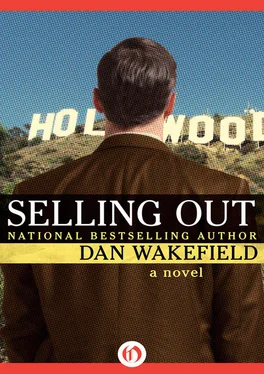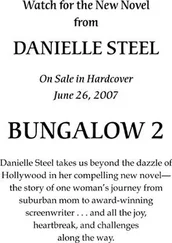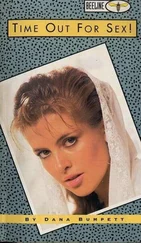Perry’s interest grew as he read further that Mellis’s aim was to produce “entertainment that holds the mind as well as the eye,” and to achieve this, his first goal was to enlist “writers of quality.” Mellis vowed to look beyond the tired old “Hollywood hacks” and bring to the airwaves America’s treasury of living fictional talent, those writers “whose powerful work is known only to a handful of readers of little magazines and hardcover books because no one has ever tried to present their vision to a vast public that would appreciate and welcome it.”
Perry put down the magazine and stood up.
“Well?” Jane asked.
“He talks a good game,” Perry said.
Obviously, this Mellis character was full of himself and no doubt enjoyed the sound of his own fine rhetoric. Still, Perry couldn’t help feeling a bit of a tingle, the hint of a deep-down thrill, at the possibility the brash young man had articulated. He walked to the window, then back to the chair.
“The funny thing is, I’ve been thinking that sort of thing myself for years,” Perry admitted.
Like most of the writers he knew whose work was appreciated by a small, discerning audience, Perry believed that it would be equally enjoyed and esteemed by the millions if only the archaic, expensive system of book sales, promotion, and distribution in America were designed to meet the needs and realities of the twentieth century.
Like most everyone he knew, whether writers, teachers, politicians or plumbers, he believed that if given half a chance he could, while blindfolded and with one hand tied behind him, create better entertainment than the drek that was served up to fill the hours of prime-time television.
“Didn’t I tell you?” Jane asked. “This Mellis character is looking for you .”
Perry laughed, nervously.
“How the hell is he going to find me?”
“Easy,” said Jane. “You’re going to send him a copy of your last book.”
That night Perry went to his study after dinner and wrote a brief, businesslike note to Archer Mellis at Paragon Films, attaching it with a paperclip to a copy of his last collection of stories—the one that included the O. Henry Prize winner, two others that had been selected for The Best American Short Stories of their particular year of publication, and another that won an award from the National Endowment for the Humanities. Just in case Mellis was not impressed enough with those honors, the jacket was resplendent with quotes from noted critics and fellow authors extolling the virtues of the author and his work, flattering tributes studded with the glittering names of great writers whose tradition he was said to be carrying on with distinction: Cheever, two O’Connors (Flannery, Frank), even the great Papa of all twentieth-century American writers, Hemingway himself!
Perry wore the brim of his hat pulled down and the collar of his coat pulled up when he went to the town post office to mail his package to Archer Mellis in Hollywood. He felt skittish, as if he were doing something unsavory, like sending off for tapes of pornographic movies, or dispatching semiclassified documents to a foreign government. He knew his embarrassment was silly; still, he did not plan to mention this matter to his colleagues, not even to Al Cohen. He had thought about consulting some old friends he knew out there in the movie business about the whole thing, but was afraid they would laugh and put a damper on it. He was keeping this strictly to himself and Jane.
After making his drop at the post office, Perry went to the town diner for coffee and a blueberry muffin. He felt a sense of calm, as if he had finally plugged in to a waiting connection.
From the moment he mailed the package, his life felt different. He was no longer bored. He went about his duties, his classes and committee meetings, with efficiency and courtesy; if anything, he was more polite and gracious to students and colleagues than he ever had been in the past. He felt kindly toward them, yet a bit removed, knowing he carried a wonderful secret they had no way of suspecting, a dream they couldn’t possibly share. He no longer felt confined by their concerns or judgments. He was still among them, but not of them.
Perry started watching “Entertainment Tonight,” the television program that reported from Hollywood on the latest doings in show business. The first time Jane came in the den and caught him watching it (he felt like a schoolboy masturbating in secret) he quickly said, “I just thought I might see that Archer Mellis character on here some night being interviewed about the future of television or some such bullshit.” Jane smiled and said yes, she wouldn’t be at all surprised.
After that neither Jane nor Perry said anything about his watching “Entertainment Tonight” but simply took it as a matter of course, as if he were watching “Monday Night Football,” to which he was harmlessly habituated, or another rerun of “Brideshead Revisited,” his all-time favorite TV drama, or simply the eleven o’clock news from Boston’s Channel Five, with the anchor team he found most reassuring (perhaps because he knew they were married to each other and had a baby daughter), Chet Curtis and Natalie Jacobson.
On one of its programs, “E.T.” (as Perry’s new favorite TV show was popularly known) took its viewers on the set of a movie being filmed in the Andes. It was not the dramatic setting that Perry found thrilling, but rather the showing of some anonymous crew member slapping down the arm of one of those black-and-white slateboards used in filmmaking, while the voice of another person not even visible called out, “Scene forty-two, take seven!”
Like most everyone else, Perry had seen that little ritual portrayed in countless old movies (the kind with directors in jodhpurs barking commands through megaphones), and in numerous documentaries about the business, probably even on other TV shows reporting on some film in production, yet this time it electrified him.
Perry woke a little after dawn with the words ringing in his mind: “Scene forty-two, take seven.”
He got up and dressed and bolted down some orange juice and went outside, needing to swing his arms, to walk, to be in motion. He could hear the click of the slateboard through the still country air, and the magical words, the numbers of scene and take . He responded to the ritual words as he had since childhood to the language of endeavor and challenge, the stirring phrases that put men on their mettle, sent them into action: “Full speed ahead,” “To arms,” “On guard,” “Ready, set, hup ,” “Gentlemen, start your engines …”
They all were lines from a child’s dreams of glory, the standard repertoire of adolescent fantasies, American-style, enacted in games and daydreams later in life than most people cared to admit, mixed in with additions along the way that fit into more adult realms of sex and success: “Take me, I’m yours”; “Nominated for Best Supporting Actor …”; “I want to thank … without whose help …” And now, on this lonely road in rural Vermont, such words rang in Perry’s mind from a world away, sounding like the bugle call of a more exciting life: “Scene forty-two, take seven.”
Perry stood on a ridge, looking down at the quiet houses scattered through the town and campus. He breathed deeply and went back down, invigorated and ready for coffee.
He was not really shocked when Jane walked into his study one afternoon a few weeks later, her cheeks slightly flushed, her eyes especially bright, and said in a casual tone, as if it were an everyday occurrence:
“Los Angeles is calling.”
“Is it real?” Jane asked.
Perry laughed, but he knew exactly what she meant. Stepping off the plane in Los Angeles was like arriving in some fictional foreign country. They had boarded in the icy reality of Boston, with wind whipping snow across the frozen harbor. Five hours later, filled and lulled with food and champagne, plugged into music and then a movie, the travelers woozily materialized into a bright new world of tropical temperature and color. Jane had been to San Francisco several times, but that was not as much of a culture shock—it might have been another version of Boston, but facing the opposite direction. Perry was in L.A. for a week eight years ago, but that was during summer-vacation break, so the weather was roughly the same when he landed as when he took off. The difference this time between departure and arrival was not only three thousand miles, but seventy-five degrees.
Читать дальше












